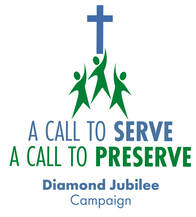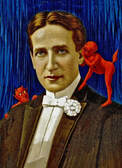 The life of the Church revolves around a different calendar than the normal January to December calendar. The Church does not celebrate the summer holidays (Memorial Day, Independence Day, and Labor Day). There is no space in our calendar for the upcoming holiday of Mother’s Day.
0 Comments
 As a congregation named “Holy Trinity,” we are familiar with the trinitarian name of the One God – “Father, Son, and Holy Spirit.” That does not necessarily mean that we understand the three persons of the One God, who exists in a union of Divine Love. It is often the Holy Spirit who is overlooked and misunderstood most – at least in our tradition of Christianity. Yet, it is the Spirit’s work that is most obvious in our daily living. The Work of the Spirit is often the most concrete manifestation of God right now, right here.
 This coming weekend, our congregation will begin a very important journey of celebration, prayer, and commitment. In 2025, our congregation will mark its 75th anniversary as a congregation and so, we will celebrate God’s blessings and abundant love as it has been revealed in our life together. We will gather ourselves in prayer because nothing is possible without God’s blessing and purpose. We will begin a time of commitment as we offer our time and our financial offerings to raise the funds necessary to make sure we can make a good start on the next 75 years of ministry in this place  Secularization is a big word used to describe a long-term trend in our culture. It refers to the simple fact that all sense of the Holy has been drained out of our existence. When everything and everyone becomes an object useful only for my enjoyment or my purchase, nothing is sacred or holy anymore. The only subject that matters is me because everything is about me. There is nothing bigger than me, beyond what I can consume or enjoy. Life becomes watered down to a simple hedonism – “Eat. Drink. Be merry (not happy or joyous). For tomorrow we die.”  I was speaking with someone the other day about being in a hurry even when we aren’t going anywhere. We get up in the morning and we hurry to make a pot of coffee or a favorite cup of tea. We must get to our prayer and devotional time. We hurry from that to then making a list of things to get done around the house. I act like everything must happen now.  Deciding to take the chance on going to a new church is risky. For some, they are new to the area and are looking to find a place where they can find connection and community. For others, they are leaving a different congregation (for a whole host of reasons) and they are also trying to find a place where they can call home.  The First Sunday in Lent always presents us with a gospel account of the temptation of Jesus. I don’t think most of us really know what to do with this story. Jesus is propelled into the wilderness (like the ancient Israelites) to contend with his identity, his survival, his purpose. Satan is part of the story and that leaves us a little uncertain, if not squeamish.  For me, the season of Lent always begins in the same way. I pour olive oil in a bowl. Then I stir in the ashes of the palms we raised in worship last Palm Sunday. I mix the two ingredients into a paste, roughly akin to peanut butter. This will become the crosses born on the foreheads of the faithful on Ash Wednesday with the words, “Remember you are dust and to dust you shall return.” It is a sign of our baptisms. It is a reminder of our finitude. It is a reminder that only God’s grace can transcend the human condition.  Lent is coming up quickly. Ash Wednesday, which marks the beginning of Lent, is next week. With Lent fast approaching, it makes me think about the invitation to observe Lent with forty days of self-examination and repentance; with prayer, fasting, self-denial; and by reading and meditating on God’s Word. Beyond that though, are the voices in my head asking, “What are you giving up for Lent this year?” |
Categories
All
Archives
July 2024
|



 RSS Feed
RSS Feed

